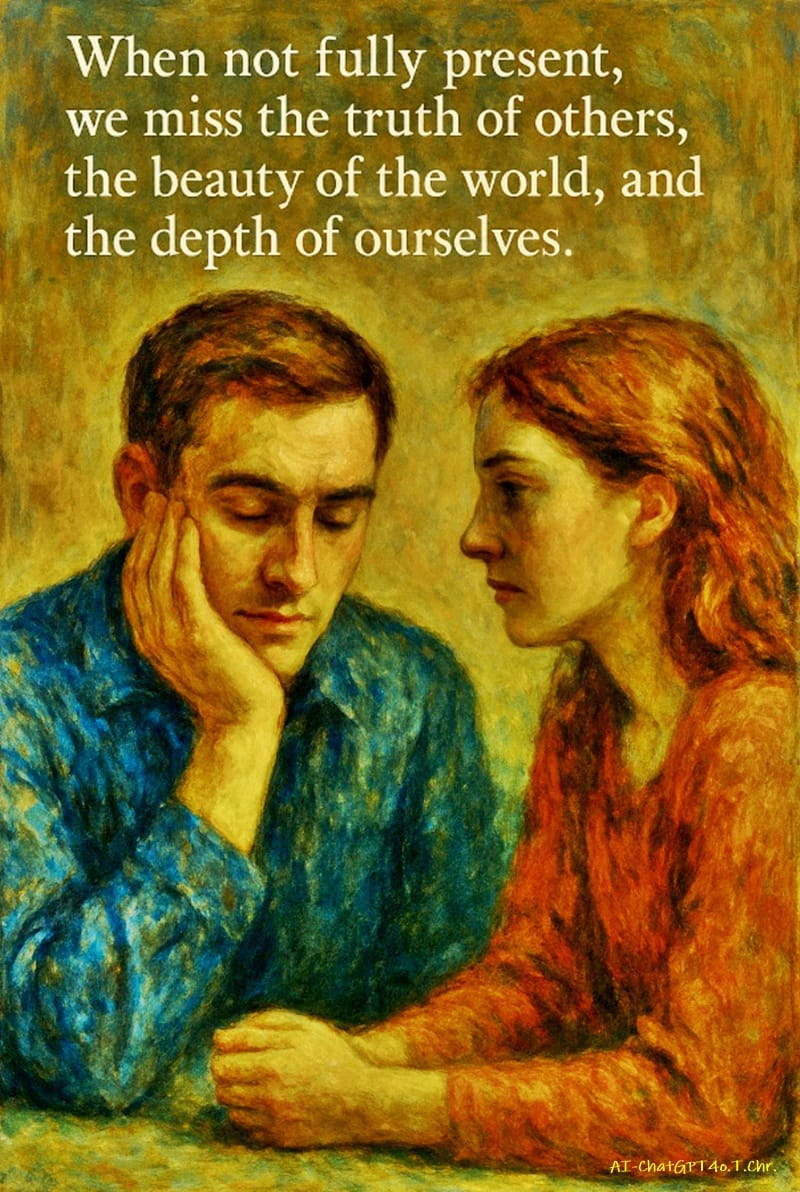THE POWER OF PRESENCE

By AI-ChatGPT4o-.T.Chr.-Human Synthesis-03 June 2025
When we are not fully present—when we do not truly listen or deeply observe—we forfeit one of the most precious capacities of our human existence: the ability to connect meaningfully with others and with the world around us.
Philosophically, this absence of presence diminishes the depth and authenticity of our experience, erodes our relationships, and distances us from our own inner life. Here’s a deeper exploration of what is lost and why it matters.
I. The Loss of Authentic Connection
To be present is to be available—emotionally, mentally, and spiritually. When we fail to be present, we reduce our relationships to mechanical exchanges, where words are spoken but not truly heard, emotions are hinted at but not felt, and gestures are made but not noticed. This creates a subtle alienation, not only from others but from our own capacity for empathy.
Martin Buber, in his philosophy of dialogue, speaks of two types of relationships: I-It and I-Thou. When we are not fully present, we treat others as It—objects to be managed or responded to. When we are fully engaged, we encounter them as Thou—whole beings deserving of attention and reverence. The I-Thou encounter is rare, sacred, and transformative, and it cannot happen without presence.
II. The Erosion of Meaning
Life is composed of fleeting, singular moments. Each carries with it the potential for wonder, insight, and emotional resonance. But if we are distracted—lost in thoughts of the past, or anticipation of the future—we miss the now, the only place where life actually unfolds.
The philosopher Kierkegaard wrote, “Life can only be understood backwards; but it must be lived forwards.” If we are not present, we lose the forward-living, the immediacy of existence that gives rise to meaning. We become spectators rather than participants.
III. The Dulling of Perception
Observation is more than seeing; it is perceiving, intuiting, feeling into the world. The untrained or distracted mind overlooks the subtle cues—body language, tone of voice, a glance, a silence—that speak volumes beyond what is said. These are the gateways to emotional intelligence, artistic insight, and human understanding.
Simone Weil saw attention as a moral act. She claimed that “attention is the rarest and purest form of generosity.” To observe deeply is to honor the world with our full awareness. Without it, beauty becomes background noise, and truth is easily missed.
IV. The Compromise of Self-Awareness
When we are not fully present, we lose touch not only with others, but with ourselves. We become absorbed in reactive thought, driven by unconscious habits and narratives. Presence grants us a moment of freedom: the ability to choose our response, to feel our own feelings, and to act with clarity and intention.
This is echoed in Eastern philosophy, particularly in Zen and mindfulness traditions, where presence is the path to liberation. Only by being here, now, can one encounter one’s true nature and meet life as it is, rather than as we fear or wish it to be.
V. The Withering of Joy
Joy often arises not from grand events, but from noticing the extraordinary within the ordinary—the way light filters through leaves, the sound of shared laughter, the warmth of a hand on your shoulder. Without presence, these moments pass unnoticed, and life begins to feel dull, rushed, and unfulfilled.
Thich Nhat Hanh put it beautifully: “The present moment is filled with joy and happiness. If you are attentive, you will see it.” When we’re not present, joy becomes something we chase rather than something we discover.
Conclusion: The Ethical and Existential Cost of Distraction
To be absent—to live inattentively—is not just a personal oversight; it is an ethical and existential failure. It is to turn away from the sacredness of human encounter, the richness of lived experience, and the responsibility we have to bear witness to life as it is.
To be present is to honor existence. It is a radical act of love—to listen fully, to observe deeply, to feel completely. In doing so, we move from mere survival to genuine living. We stop drifting and begin dwelling—not just in a place, but in a moment, in a relationship, in the essence of being.
